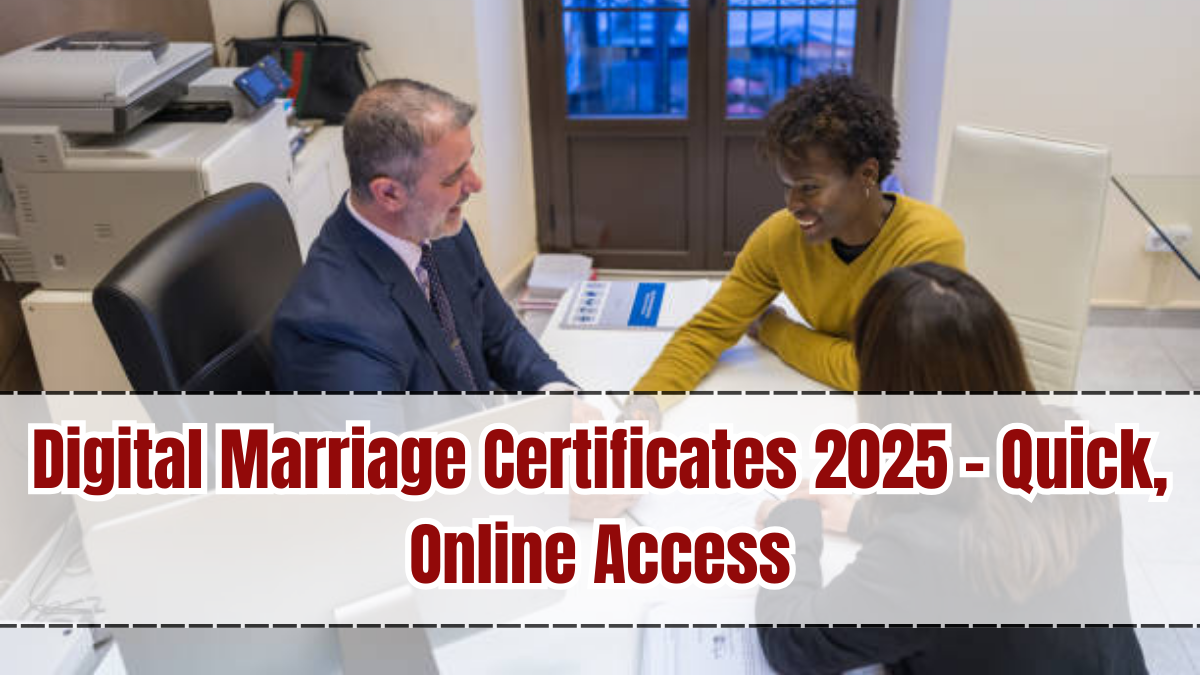Marriage registration is one of the most important civil processes, providing legal recognition and protection to couples. However, in the past, obtaining a marriage certificate often involved long queues, multiple visits to government offices, and complicated paperwork. In 2025, Digital Marriage Certificates are revolutionizing this process by making it quick, transparent, and accessible online. Couples can now register, apply, and download certificates from the comfort of their homes, reducing both time and effort.

What are Digital Marriage Certificates?
A Digital Marriage Certificate is an electronically issued and verified document that confirms the legal status of a marriage. It is stored in government e-governance databases and can be accessed anytime through official portals or mobile apps.
Key features include:
-
Online application and verification systems.
-
QR codes and digital signatures for authenticity.
-
Integration with national identity databases for easy validation.
-
Instant download options for couples after approval.
-
Secure cloud storage ensuring lifelong accessibility.
Why They Matter in 2025
The importance of Digital Marriage Certificates 2025 lies in their convenience and reliability. Traditional paper certificates were vulnerable to loss, damage, or forgery, creating legal complications for couples. Digital certificates eliminate these risks by offering secure, verifiable documents. They are also essential for accessing other services such as visas, property rights, and joint bank accounts, making them a vital part of e-governance.
Benefits of Digital Marriage Certificates
The move to digital certification offers numerous advantages:
-
Convenience: Couples apply and receive certificates without visiting offices.
-
Security: QR codes and digital signatures prevent fraud.
-
Time-Saving: Reduces delays in marriage registration and documentation.
-
Global Recognition: Easier validation for international purposes like immigration.
-
Sustainability: Paperless processes contribute to eco-friendly governance.
Role of Technology
Technology ensures the efficiency and authenticity of digital marriage certificates. Blockchain is being tested for tamper-proof storage, while AI-powered systems validate applications and detect fraudulent entries. Cloud databases make certificates easily retrievable, and mobile applications provide user-friendly access. With biometric integration, verification becomes seamless, ensuring that only genuine applicants receive valid certificates.
Government and Industry Initiatives
Governments around the world are adopting digital marriage registration as part of broader digital identity initiatives. In India, for example, digital marriage certificates are linked with Aadhaar and DigiLocker, allowing instant access. Many other countries are integrating civil registration services with e-portals, making the process simpler and more transparent. Tech startups are also offering support to governments in creating secure platforms for digital certification.
Future of Digital Marriage Certificates
By 2030, marriage registration systems may become fully automated. Couples could complete the process through AI-driven chatbots and video verification without physical presence. Smart contracts may be introduced, ensuring instant recognition of marriages across multiple jurisdictions. Certificates could also be linked with family services such as healthcare and education, creating a unified digital family identity system.
Conclusion
Digital Marriage Certificates 2025 represent a major step forward in simplifying and modernizing civil services. They provide security, convenience, and transparency, ensuring couples can access their legal proof of marriage anytime, anywhere. As governments embrace e-governance, these certificates will not only streamline registration but also integrate seamlessly with other essential services, making family documentation truly digital.
FAQs
What are Digital Marriage Certificates 2025?
They are electronically issued certificates that provide legal proof of marriage, accessible through online platforms.
How do they improve the registration process?
They eliminate paperwork, reduce waiting times, and provide instant, secure access to marriage certificates.
Are digital certificates valid abroad?
Yes, they are globally recognized, especially when linked with QR codes and digital verification systems.
What technologies secure these certificates?
They use blockchain, AI verification, cloud storage, and QR codes for authentication and security.
What is the future of digital marriage certificates?
Future systems may use AI chatbots, video verification, and smart contracts for fully automated, global recognition.
Click here to know more.
